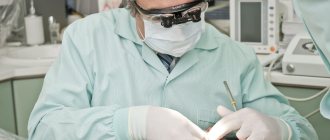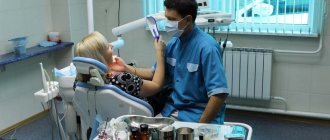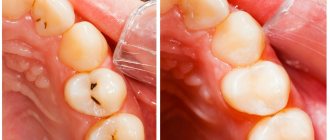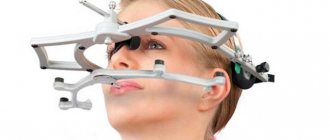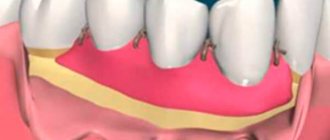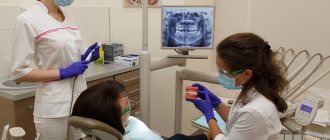- What is implantation
- Which doctor performs the procedure
- Indications and contraindications
- Features of the procedure
- Possible complications
- In conclusion
Modern dentistry now has enormous capabilities not only for treatment, but also for dental restoration. Among dental procedures, the installation of implants now occupies a leading position. Many people think about this operation, but most have questions: who does dental implantation and what are the features of the procedure. Such information is necessary in order to avoid receiving poor-quality services and possible further complications when choosing dentistry (often arise if implantation is carried out by an unqualified specialist).
What is implantation
People who have not previously encountered implantation have somewhat generalized information about this dental procedure. The installation of implants is often mistakenly mistaken for prosthetics. However, these are mini-operations, despite the similar goals, dental restoration is a completely different procedure.
Implantation is a dental operation to insert a pin or, as they are correctly called, an implant into the jaw tissue (in place of a missing tooth). In the future, the pin will replace the root, on which a structure will be installed to replace the tooth.
The operation has many features, one of which is the absence of the need for your own bone and jaw tissue. Unlike prosthetics, this method is used even in severe cases of dental pathologies.
The success of the procedure largely depends on which doctor installs the dental implants. If a specialist makes mistakes, serious complications are possible that require immediate treatment.
Does it hurt to put teeth in?
It is impossible to say that it is possible to insert ceramic teeth so that the patient does not experience discomfort at any stage. Any prosthesis cannot be made perfectly right away, so it must be adjusted. And if a chewing tooth is inserted incorrectly, it can touch soft tissue when a person chews or even talks. Sometimes even a patient can come and start complaining that after he had a tooth inserted, it hurts. On the one hand, this may seem funny, since an artificial structure cannot hurt on its own. On the other hand, this is a reason to pay attention to the condition of soft tissues, because they are the ones that can hurt and become inflamed. If the prosthesis is made on an inlay, that is, with a real tooth root, then there may be options for the development of periostitis and other inflammatory processes. It is enough for the infection to get into the canal at the root, and the body may not be able to cope with it on its own.
Not only a ceramic tooth can be inserted unsuccessfully, but also a plastic or metal-ceramic one. If possible, the doctor should adjust such a prosthesis on the day of installation so that the patient does not experience pain. The most difficult thing is with removable dentures, as they require long-term correction. Initially, the installation of this orthopedic structure does not cause discomfort, but it may appear later, when the patient has already left the office.
Such dentures rub the gums, so they have to be ground down, and it is not always possible to identify all the problem areas the first time, so that a person feels with the removable structure as with his own teeth. But this is a good way to insert teeth on a limited budget.
Which doctor performs the procedure
In the majority, people believe that a dentist is a generalist doctor who alone performs absolutely any procedure in this field of medicine. This is not at all true; in dentistry there are several areas where doctors of a certain specialization work.
Of course, one doctor can have several specialties, however, for example, to perform surgical operations (including implantation) requires appropriate qualifications.
So who puts implants? Which specialist should you contact if you need a service?
The first appointment is most often carried out by a dentist in the therapeutic department to determine the indications and prescribe diagnostics. If the patient has no contraindications, and the need for implantation is confirmed, then a day of surgery is scheduled, which will be performed by a doctor with experience in installing implants and prosthetics. Which doctor performs dental implants? Popularly, such a doctor is called an implantologist; in medicine, a surgeon or orthopedist.
Preparing for an appointment and how to see a doctor
It is not recommended to drink alcohol before seeing a specialist. The presence of alcohol in the patient's blood negatively affects the effect of anesthetic drugs. If the patient is sick, then you should postpone your visit for a while. Before coming to the dental office, you should thoroughly brush your teeth. Therefore, it is advisable to discuss the time of your appointment with the dentist in advance.
At the first consultation, the doctor must determine the degree of damage to the patient’s masticatory apparatus. Before starting orthopedic treatment, complex surgical and therapeutic treatment of the oral cavity is carried out. This makes it possible to carefully prepare the soft and hard tissues of the patient’s maxillofacial area for upcoming procedures. Treatment of the following diseases is mandatory:
- Pulpitis,
- Caries,
- Scar changes in the mucous membrane,
- Stomatitis, gingivitis, periodontitis.
During the appointment, the orthopedic dentist examines the patient’s oral cavity and listens to complaints. The inspection can be visual and instrumental. Next, the doctor takes impressions and photographs the dentition. If necessary, a consultation with a dental surgeon is scheduled. Based on the data obtained, the doctor draws up a further treatment plan for the patient.
Indications and contraindications
Implantation cannot be performed at the first visit, only at the request of the patient. In order to install implants, the dentist must confirm the indications for surgery.
Indications include pathologies of the dentition or jaw bones:
- missing one tooth;
- absence of 2 or more dental organs, with adjacent location;
- absence of the last teeth without the possibility of restoration by other methods;
- complete edentia (congenital pathology characterized by the absence of teeth);
- the presence of reasons preventing the wearing of a removable denture (for example, a gag reflex);
- pain caused by functional occlusion;
- absence of alveolar processes in the upper jaw with concomitant complete absence of teeth;
- anatomical defects that arise as a result of diseases, mechanical effects, as well as as a result of disturbances during intrauterine development or genetic predisposition.
In implantology, each case is necessarily considered taking into account the individual characteristics of the dental composition and jaw structure of each patient. An implant can be placed only after diagnosis. A qualified specialist will not carry out the procedure without a preliminary examination.
Contraindications
Diagnostics are necessary not only to confirm the indications, but also to determine the possible presence of contraindications to implantation.
Absolute contraindications for which implants should not be installed include diseases and pathological conditions:
- severe diseases of the cardiovascular system;
- malignant oncological diseases;
- diseases of the nervous system;
- blood pathologies (especially poor clotting);
- severe connective tissue diseases;
- open tuberculosis;
- liver/renal failure during exacerbation;
- increased tone of the masticatory muscles in combination with bruxism;
- diabetes mellitus;
- immunodeficiency diseases;
- allergic reaction to painkillers;
- addiction to drugs or alcohol.
Implantation is not carried out for women carrying a child, as well as for children under 18 years of age. Fixed dentures are not installed until the age of 22. This is due to the fact that until the age of 22, a person’s jaw continues to grow and form. Between the ages of 22 and 25, surgery is performed only for serious indications.
The benefits of progress
Living in the 21st century, we sometimes don’t realize how lucky we are. It is not even necessary to compare the current state of affairs with, for example, the Middle Ages, when the teeth of deceased people were used as prosthetics. Just look back 30-40 years. In the Soviet Union, crowns on the front teeth became an automatic “sentence” for a smile - after all, metal dentures oxidized and looked unaesthetic.
Interesting fact! During the war between the North and South, entire barrels with the teeth of dead soldiers were sent from the United States to Great Britain. They made prosthetics from them.
Nowadays, the specialist who places crowns on teeth has access to many tools and materials that allow him to install dentures that are indistinguishable from real teeth.
Features of the procedure
Implantation is performed in several stages, which the patient is recommended to inquire about in advance. Depending on the type of procedure and type of implants, the operation can be performed in one step, or it can stretch over several stages, which will take up to six months. If long-term treatment is expected, temporary structures and crowns are installed.
Types of implants
Dentistry offers several options for implants. However, they are all made of the same titanium. This material is considered the most reliable and safe. All products are divided into several types according to design and shape. Depending on the indications, the most suitable installation option is selected. In addition to indications, the choice of implant model is also influenced by their cost. Modern designs tend to be more expensive, but more convenient and durable.
By type of design:
- collapsible
- non-separable.
According to the shape of the products:
- lamellar - screwed into the bone tissue under the palate;
- root-shaped - installed in root canals;
- combined - placed in the root canal.
The clinic’s specialists are qualified and experienced in installing any type of implants. The dentist will recommend which type of implants is suitable, based on the patient’s indications and wishes.
Installation Methods
The A-Medic clinic is equipped with exclusively modern technology, which allows us to perform all types of dental implantation. Implantologists have sufficient experience to solve problems even with complex dental pathologies.
Surgical dentistry, depending on the characteristics of the jaw, offers three options for dental implantation:
- basal - an inexpensive and quick method that allows you to install implants, and even more than one, immediately after tooth extraction;
- intraosseous - a method recommended after bone grafting;
- laser - a low-traumatic operation, possible only if the bone is preserved with a height of at least 6 mm;
- subperiosteal - an implantation method used when the patient lacks bone tissue (does not require additional bone augmentation);
- transgingival - a minimally invasive technique is used to open the gum tissue to install one or more products;
- endodonto-endosseous - the pin is inserted into the canal (the gum is not cut), allowing the root to be preserved;
- intramucosal - used in the absence of intraosseous implantation, suitable for increasing the fixation rates of removable dentures;
- transosseous - recommended for atrophy of the soft and bone tissues of the lower jaw;
- Express - implantation - temporary introduction of an implant and a temporary crown.
The dental clinic performs operations for both partial restoration of dental organs and turnkey dental implantation. You can read reviews about the results of the specialists’ work on the company’s website and on third-party sites.
Diagnostic methods
Based on the individual characteristics of the patient’s teeth, the doctor selects appropriate research methods. A panoramic photograph of the jaw, an orthopantomogram, or an x-ray of one or more teeth may be offered. A couple of months after prosthetics, the patient will need to take a control photo to evaluate the work performed.
After conducting instrumental diagnostics, the orthopedic dentist can prescribe consultations with other specialized specialists, for example, an orthodontist. After all the data necessary for treatment has been collected, the doctor draws up a plan for further therapy for the patient. All responsibility for the correct selection and production of an individual prosthesis lies with the orthopedic surgeon.
Possible complications
Dental implants are a foreign material for the body, so the risk of complications can never be excluded. Modern product installation methods and techniques can minimize this risk as much as possible.
Possible complications:
- seam divergence;
- severe pain for more than three days;
- formation of hematomas;
- the appearance of bleeding;
- development of soft tissue inflammation.
Such complications are rather exceptions that arise due to compliance with the doctor’s advice on care during the rehabilitation period.
Somewhat more often, implant rejection and inflammation of the bone and gum tissue near the implant occur. The cause of inflammation can be insufficient oral care or violation of doctor’s recommendations. Implant rejection is an individual reaction of the body. The result is also influenced by which doctor places the dental implants. A qualified specialist will not make mistakes during the operation, and will monitor the patient’s condition throughout the entire rehabilitation in order to take timely measures and prevent complications.
Where can I get quality teeth inserted?
If you need prosthetics, it is better to choose a clinic where they do it efficiently. If you don’t have someone who can recommend a doctor or medical institution, then you should go to the website of the clinic that interests you. If it describes in detail how, for example, to insert teeth made of zirconium or metal-ceramics, then this is already a plus. If there is information about specialists, photographs of dentists and dental technicians, then this inspires even more confidence, and when there are one or several pages with certificates - both of the organization and of the doctors - this is the best option. If you still doubt that this is a clinic where they can insert high-quality teeth, then you can call and make an appointment with a doctor. This way you will form an impression of the doctor and understand whether you can be treated by him. After all, personal contact between the doctor and the patient also decides a lot.
In conclusion
Many people believe that installing implants is harmful to the body, since serious complications are possible. However, we should not forget that the absence of teeth also negatively affects health, since in addition to aesthetics (smile), a person’s teeth also perform a certain function (chewing food). The absence of certain teeth leads to a decrease in self-esteem, which affects a person’s psycho-emotional state, as well as problems with the gastrointestinal tract, since food is not chewed thoroughly enough.
You should not delay your visit to the doctor, assuming that implantation will cost too much or that it is not necessary. Of course, this is not a cheap service, but the result is worth the money spent.
Is it expensive to get teeth inserted?
Unfortunately, if you expect to receive the services of an orthopedic dentist under your insurance policy, then you will not be able to do this. Of course, if you belong to preferential categories of citizens, then you can use such medical care for free or receive substantial compensation. In other cases, you can only count on a tax deduction. Therefore, there is no big difference whether you go to a private or public dental clinic. Sometimes even commercial medical institutions hold promotions that will make prosthetics cheaper for you.
iOrtho Blog
Why do chipped teeth occur and how to get rid of them?
Ligature braces: types and application features
Types of mouth guards for bruxism and features of their use
Billie Eilish, Grammy and Invisalign
Pain during tooth extraction: why and how long does it hurt?
Molars and premolars: main differences and features
Plates for dentition correction: features and effectiveness of use
Tooth erosion: what is it and how to treat it?
Responsibilities of an orthopedic dentist
The responsibilities of a prosthetist are focused on diagnostic, preventive and industrial conditions. The prosthodontist (or prosthodontist) performs an oral medical examination and takes impressions of the surrounding tissues in the mouth, providing quality prosthetic care to replace and protect natural teeth for each individual patient.
Everything you need to know about temporary crowns
- Olga Alexandrovna Novikova
- October 4, 2022
As part of the practice of manufacturing artificial prostheses and fitting them to patients, a specialist must:
- assess the condition of the oral cavity and teeth, analyze the patient's medical and dental history, including vital signs (blood pressure, blood glucose levels);
- conduct an examination to develop a treatment regimen;
- refer patients with complex dental conditions to the appropriate specialist;
- thoroughly understand the biomechanics of the dental system and offer the patient prosthetic options (crowns, bridges, inlays, implants);
- make plaster or stone impressions (casts);
- select artificial teeth for complete or partial dentures, carry out fitting, fitting, fastening;
- at the request of the patient, perform additional services: correction, repair of prostheses.
An orthopedic dentist can also treat injured oral tissues and order an x-ray (without interpretation).
A specialist who improves the function and aesthetics of teeth and, accordingly, the quality of life, has received a medical education with a specialization in dental orthopedics and is also qualified as a dental technician.
Dentist surgeon
One of the most difficult specializations in dentistry is surgery. Doctors perform surgical interventions during the treatment of diseases and help eliminate defects that worsen a person’s appearance. A dental surgeon performs a wide range of services:
- removes teeth;
- treats dislocations of teeth and joints;
- performs jaw surgery;
- eliminates stomatitis, pulpitis, gingivitis;
- neutralizes the infectious process;
- removes the consequences of injuries and congenital defects of the oral cavity.
Often, a prosthetist combines practice with surgical activities.
The surgeon, in tandem with the orthopedist, prepares the jaw for prosthetics, inserts and removes implants.



